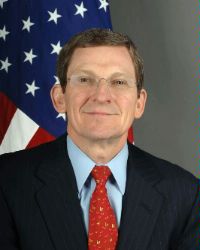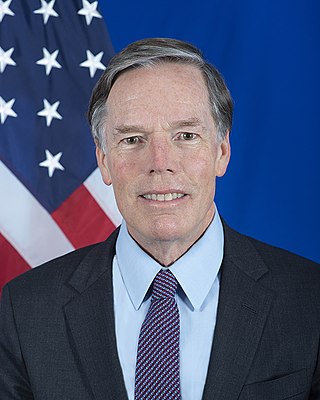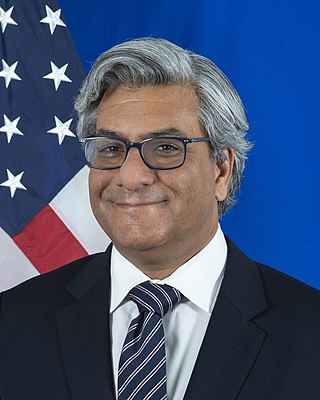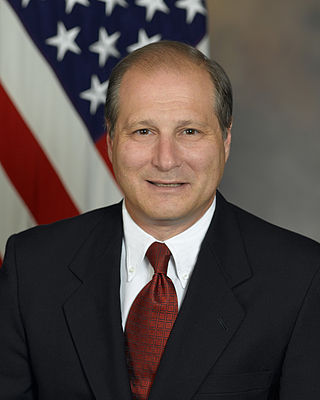
James Phillip Rubin is an American former diplomat and journalist who served as U.S. Assistant Secretary of State for Public Affairs in the Clinton Administration from 1997–2000. He wrote a regular column on foreign affairs for The Sunday Times of London, and is currently Diplomatic Counselor to the newly elected Secretary General of the Organization for Economic Cooperation and Development (OECD).

Brent Scowcroft was a United States Air Force officer who was a two-time United States National Security Advisor, first under U.S. President Gerald Ford and then under George H. W. Bush. He served as Military Assistant to President Richard Nixon and as Deputy Assistant to the President for National Security Affairs in the Nixon and Ford administrations. He served as Chairman of the President's Foreign Intelligence Advisory Board under President George W. Bush from 2001 to 2005, and advised President Barack Obama on choosing his national security team.

Marc Isaiah Grossman is an American former diplomat and government official. He served as United States Ambassador to Turkey, Assistant Secretary of State for European Affairs, and Under Secretary of State for Political Affairs. He was most recently the United States Special Representative for Afghanistan and Pakistan and is currently a Vice Chairman of The Cohen Group, a business strategic advisory firm headed by former U.S. Secretary of Defense William Cohen, and a Vice Chair of the German Marshall Fund board of trustees.

Robert Kagan is an American columnist and political scientist. He is a neoconservative scholar. He is a critic of U.S. foreign policy and a leading advocate of liberal interventionism.
Lawrence J. Korb is a senior fellow at the Center for American Progress and a senior adviser to the Center for Defense Information. He was formerly director of national security studies at the Council on Foreign Relations in New York.

Robert Nicholas Burns is an American diplomat and international relations scholar who has been serving as the United States ambassador to China since 2022.

Relations between Afghanistan and the United States began in 1921 under the leaderships of King Amanullah Khan and President Warren G. Harding, respectively. The first contact between the two nations occurred further back in the 1830s when the first recorded person from the United States explored Afghanistan. The United States government foreign aid program provided about $500 million in aid for economic development; the aid ended before the 1978 Saur Revolution. The Soviet invasion of Afghanistan in 1979 was a turning point in the Cold War, when the United States started to financially support the Afghan resistance. The country, under both the Carter and Reagan administrations committed $3 billion dollars in financial and diplomatic support and along with Pakistan also rendering critical support to the anti-Soviet Mujahideen forces. Beginning in 1980, the United States began admitting thousands of Afghan refugees for resettlement, and provided money and weapons to the Mujahideen through Pakistan's Inter-Services Intelligence (ISI). The USSR withdrew its troops in 1989.

Salman Ahmed is an American national security and foreign policy advisor serving as the director of policy planning in the Biden administration.

Eric Steven Edelman is an American diplomat who served as Under Secretary of Defense for Policy (2005–2009), U.S. Ambassador to Turkey (2003–2005), U.S. Ambassador to the Republic of Finland (1998–2001), and Principal Deputy Assistant to the Vice President for National Security Affairs (2001–2003). A career Foreign Service Officer, Edelman entered the Senior Foreign Service in 1992. He is a recipient of the Secretary of Defense's award for Distinguished Civilian Service (1993) and the State Department's Superior Honor Award.

James Braidy Steinberg is an American academic administrator and former diplomat, who served as the United States deputy secretary of state during the Obama administration. He has been the dean of the Paul H. Nitze School of Advanced International Studies (SAIS) at Johns Hopkins University since November 1, 2021. Previously he was a professor at the Maxwell School of Citizenship and Public Affairs at Syracuse University.

Francis Joseph Ricciardone Jr. is a former President of the American University in Cairo. Ambassador Ricciardone was the United States ambassador to Turkey between 2011 and 2014. Previously he was Deputy Ambassador at the U.S. Embassy in Kabul, Afghanistan. He was also on leave from the U.S. Department of State as a guest scholar at the U.S. Institute of Peace. He has served as U.S. Ambassador to the Arab Republic of Egypt (2005–2008), the Republic of the Philippines and the Republic of Palau (2002–2005). As a career member of the Senior Foreign Service, he received U.S. government and other organization awards for his work in foreign policy and program management, political reporting and analysis, and peacekeeping.

Wendy Ruth Sherman is an American diplomat who served as the United States deputy secretary of state from April 2021 to July 2023. She was a professor of the practice of public leadership and director of the Center for Public Leadership at the Harvard Kennedy School, a senior counselor at Albright Stonebridge Group, and a senior fellow at the Belfer Center for Science and International Affairs.

Thomas Edward Donilon is an American lawyer, business executive, and former government official who served as the 22nd National Security Advisor in the Obama administration from 2010 to 2013. Donilon also worked in the Carter and Clinton administrations. He is now Chairman of the BlackRock Investment Institute, the firm's global think tank.

Hugo Llorens is a retired American diplomat. He is a former U.S. Special Chargé d'Affaires of the U.S. Embassy in Kabul, Afghanistan, (2016–17) and United States Ambassador to Honduras (2008–2011). In his 36-year career he was posted to numerous countries spanning 6 continents. In 2002–2003, he joined the White House staff and served as Director of Andean Affairs advising the President and National Security Advisor on issues pertaining to Colombia, Venezuela, Bolivia, Peru, and Ecuador.

Earl Anthony Wayne is an American diplomat. Formerly Assistant Secretary of State for Economic and Business Affairs, Ambassador to Argentina and Deputy Ambassador to Afghanistan, Wayne served nearly four years as Ambassador to Mexico. He was nominated by President Obama and confirmed by the Senate in August, 2011. He departed Mexico City for Washington July 31, 2015 and retired from the State Department on September 30, 2015. Wayne attained the highest rank in the U.S. diplomatic service: Career Ambassador. He is currently a Professorial Lecturer and Distinguished Diplomat in Residence at American University's School of International Service where he teaches courses related to diplomacy and US foreign policy. Wayne also works with the Woodrow Wilson International Center for Scholars, the Atlantic Council, the Center for Strategic and International Studies,. Wayne is co-chair of the Mexico Institute's Advisory Board at the Wilson Center. He is also on the board of the American Academy of Diplomacy and the Public Diplomacy Council of America. Wayne is an independent consultant, speaker and writer and works with several not-for-profit professional associations. He was an adviser for HSBC Latin America on improving management of financial crime risk from 2015 until 2019 and served on the board of the American Foreign Service Association from 2017 to 2019.
For purposes of U.S. foreign policy, South Asia consists of Afghanistan, Bangladesh, Bhutan, India, the Maldives, Nepal, Pakistan, and Sri Lanka. The Assistant Secretary of State for South and Central Asian Affairs was Nisha Desai Biswal.

Andrew J. Shapiro is an American attorney and diplomat who served as the 17th Assistant Secretary of State for Political-Military Affairs from 2009 to 2013. Shapiro is currently a managing director at Beacon Global Strategies LLC, which he founded with partners Jeremy Bash and Philippe Reines in 2013.

Jacob Jeremiah Sullivan is an American attorney serving since 2021 as the U.S. National Security Advisor. He previously served as Director of Policy to President Barack Obama, National Security Advisor to then-Vice President Biden and Deputy Chief of Staff to Secretary Hillary Clinton at the U.S. Department of State. Sullivan also served as senior advisor to the U.S. federal government at the Iran nuclear negotiations and senior policy advisor to Clinton's 2016 presidential campaign, as well as visiting professor at Yale Law School. On November 23, 2020, President-elect Biden announced that Sullivan would be appointed the United States National Security Advisor. He took office on January 20, 2021.

The Foreign Affairs Policy Board is an advisory board that provides independent advice and opinion to the Secretary of State, the Deputy Secretary of State, and the Director of Policy Planning on matters concerning U.S. foreign policy. The Board reviews and assesses global threats and opportunities, trends that implicate core national security interests, tools and capacities of the civilian foreign affairs agencies, and priorities and strategic frameworks for U.S. foreign policy. The Board meets in a plenary session several times a year at the U.S. Department of State in the Harry S. Truman Building.

Andrea Lee Thompson is an American government official and former military officer. She is the former Under Secretary of State for Arms Control and International Security Affairs. Prior to this, she was the National Security Advisor to Vice President Mike Pence. Before entering government service, she was a career intelligence officer in the United States Army.




















